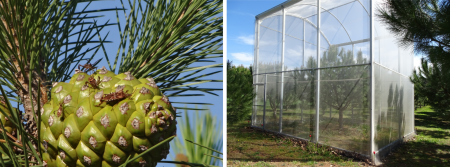
Objective:
Some experiments conducted at the Institute of Agri-Food Research and Technology of Catalonia (IRTA), aimed at evaluating the productive capacity of Stone pine clones from different Spanish provenance regions (PR) under Leptoglossus occidentalis Heideman attack, are presented. This pest is severely affecting Stone pine stands in the Iberian Peninsula, hence, identifying genotypes less susceptible to L. occidentalis attack is an important line of research in this area.
Context:
In the current context of climate change, the intensity and recurrence of droughts has triggered stress conditions that reduce the defensive capacity of Mediterranean forests. This tree weakening and the increased arrival of harmful exotic organisms triggers the emergence of pests and diseases. For Pinus pinea L., the Western conifer seed bug (L. occidentalis) is a recent pest in Spain, the incidence of which has decimated pine-seeds production in just 5 years. To the date, no biological control has been developed against it, and the most promising line of research involves identifying pines with greater resistance to seed predation.
Contacts:
Raul de la Mata Pombo, raul.delamata@irta.cat, www.irta.cat
Anna Teixidó, anna.teixido@irta.cat, www.irta.cat
Neus Aletà, Neus.Aleta@irta.cat, www.irta.cat
Further information:
de la Mata R, Teixidó A, Aletà N (2019). Clonal variation in susceptibility to Leptoglossus occidentalis in grafted plantations. Wild nuts & berries iNet Interregional Workshop ‘Wild harvest in time of new pests, diseases and climate change’, Palencia, Spain, 12-14 June 2019. INCREdible Thematic Network on Innovation in Mediterranean Non-Wood Forest Products.